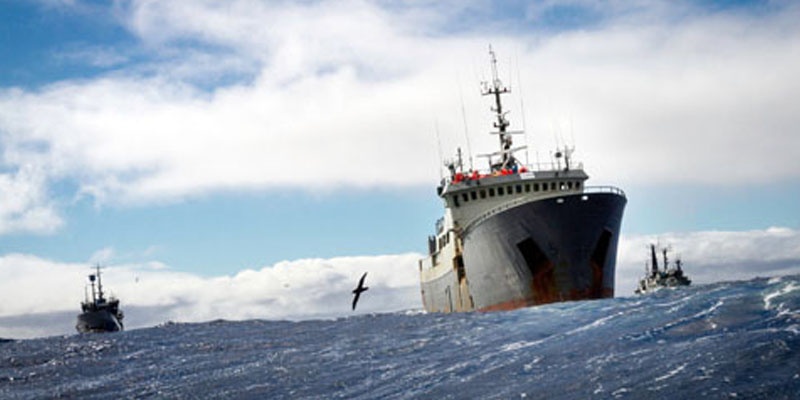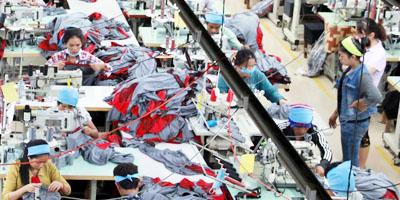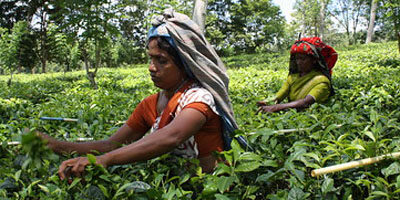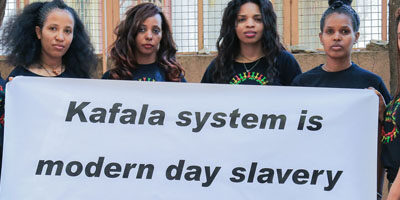In the global fishing industry illegal practices have increased, including the slavery of fishers. How can this phenomenon be explained? How can fishers be protected? To find out, I spoke with Elise Gordon, senior research analyst with the Australian NGO Walk Free, and Sompong Srakaew, founder and director of the Labour Protection Network in Thailand.
Fishers trapped in forced labour are often desperate men from poor countries. “People ending up aboard these fishing vessels are low skilled workers who don’t have much knowledge of the situation and don’t have the opportunity to find work elsewhere,” Elise Gordon told me.
“Fishers are kept at sea for really long periods of time; they cannot just get of the vessel and walk away. They have to endure really long working hours in unhygienic conditions. Food or water may be held as punishment to ensure they keep working for long hours, and their pay may be withheld. Identity documents are often confiscated, and threats of violence and actual violence are happening. Some fishers have actually been thrown overboard.”
Migrants are typically more vulnerable to modern slavery, says Sompong Srakaew, whose foundation LPN defends migrants,

Gordon defines modern slavery as “any situation of exploitation that a person cannot refuse or leave because of threats, violence, coercion, deception, and/or abuse of power.” The abuse is not new in the fishing industry, yet few people are aware of it. As Srakaew says, modern slavery has only changed its form to be more discreet, to go unnoticed.
“It can happen in any part of the world, but there are some high-risks areas,” Gordon says, including several regions in Asia, such as China, Taiwan, Thailand, Japan, and South Korea, where the fishing industry plays a very important role. The West African coasts are also high-risk areas, but many fishers from Asian countries can be found on the fishing vessels in those areas. Forced labour occurs where there is a combination of poor regulation in the waters and vulnerable people.
Modern slavery to maintain profit
Modern slavery at sea developed with the rise of the fishing industry over the past fifty years. The demand for fish, supported by globalization, has exploded. Gordon says that for many countries fishing is an important part of their economy. “The seafood that is caught with exploited labour ends up in the supply chains all over the world,” she says. “Western countries are certainly driving that demand.”
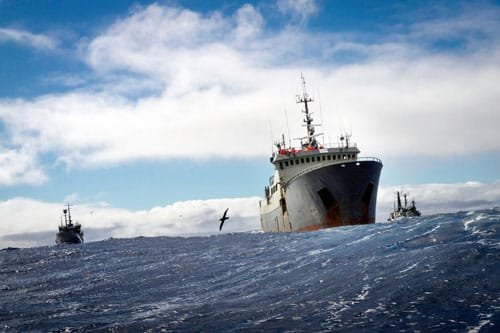
According to Gordon, the problem revolves around the desire to make a profit. Increasingly difficult conditions have led to numerous illegal practices that often go hand in hand – fishing beyond authorized quotas, fishing in protected areas, and of course forced labour.
“It is getting harder and harder for fishing vessels to make profit,” she says. “There are many more fishing vessels at sea, and fewer fish to catch, so fishers have to work longer and go further. Because they need more effort to catch the same amount of fish, vessels operators have to cut costs in other areas, which can be labour costs. People on board represent half of the operating costs. Forced labour becomes then an easy way to make more profit.”
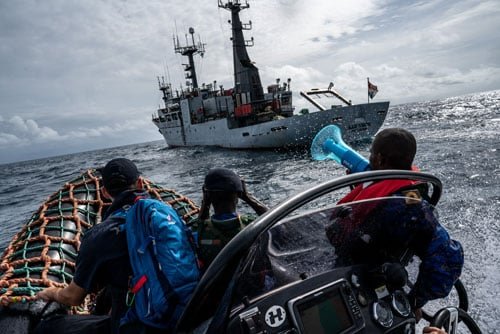
Everything happens at sea, out of sight and control
Modern slavery at sea is very specific. At sea, fishers are subject to the decisions of the captain. Jurisdiction at sea is complex, Gordon says, which makes the protection of seafarers more difficult. “When they are at sea outside of any country’s jurisdiction, fishers are depending on many laws,” she says. “Many jurisdictions are involved, and laws are not uniformed across all countries. For example, a vessel can be owned by a Chinese company, the captain may be Taiwanese, the crew from all of Southeast Asia, and the vessel flagged to a country in Africa. It makes it hard to provide justice for people that are abused.”
When they are blacklisted or to avoid being so, some vessels stay at sea during many months or even many years. These are ghost vessels. They pass their catch to other vessels which are going to dock. Fishers trapped in forced labour are thus kept at sea. This makes monitoring of illegal activities more difficult, even moreso for governments with few resources.
All stakeholders can change the situation

Srakaew and Gordon outlined some solutions to provide better protection for fishers and avoid forced labour. For Srakaew, the first thing to do is to listen to the voices of migrants, the main victims of modern slavery at sea in Thailand. Fishers often don’t know where to turn when they decide to seek help. “We should be ensuring that there is a collective bargaining, right to unionize, so that fishers can have a greater voice,” he said. The LPN Foundation also stresses the importance of education before people get trapped.
According to Gordon, governments can do a lot to tackle forced labour at sea. “They need to improve monitoring technologies. We need much better data on the extent of modern slavery to know how many people exactly are exploited on fishing vessels,” she said. “And wealthier governments can help poor governments to improve their monitoring capacities.”
Finally, Gordon says that consumers can also take part. “It is about consumers educating themselves to know how the sea food what caught. However, it is still very difficult to do because of the lack of transparency in this sector.”
Srakaew says that the private sector should also play its role. “We need more transparency on what is happening along the supply chain. The private sector needs to tell the truth about what really happens rather than to put everything under the cover.”
“The awareness is growing around the exploitation happening in the fishing industry,” he said. “Even so, we have a long way to go.”
